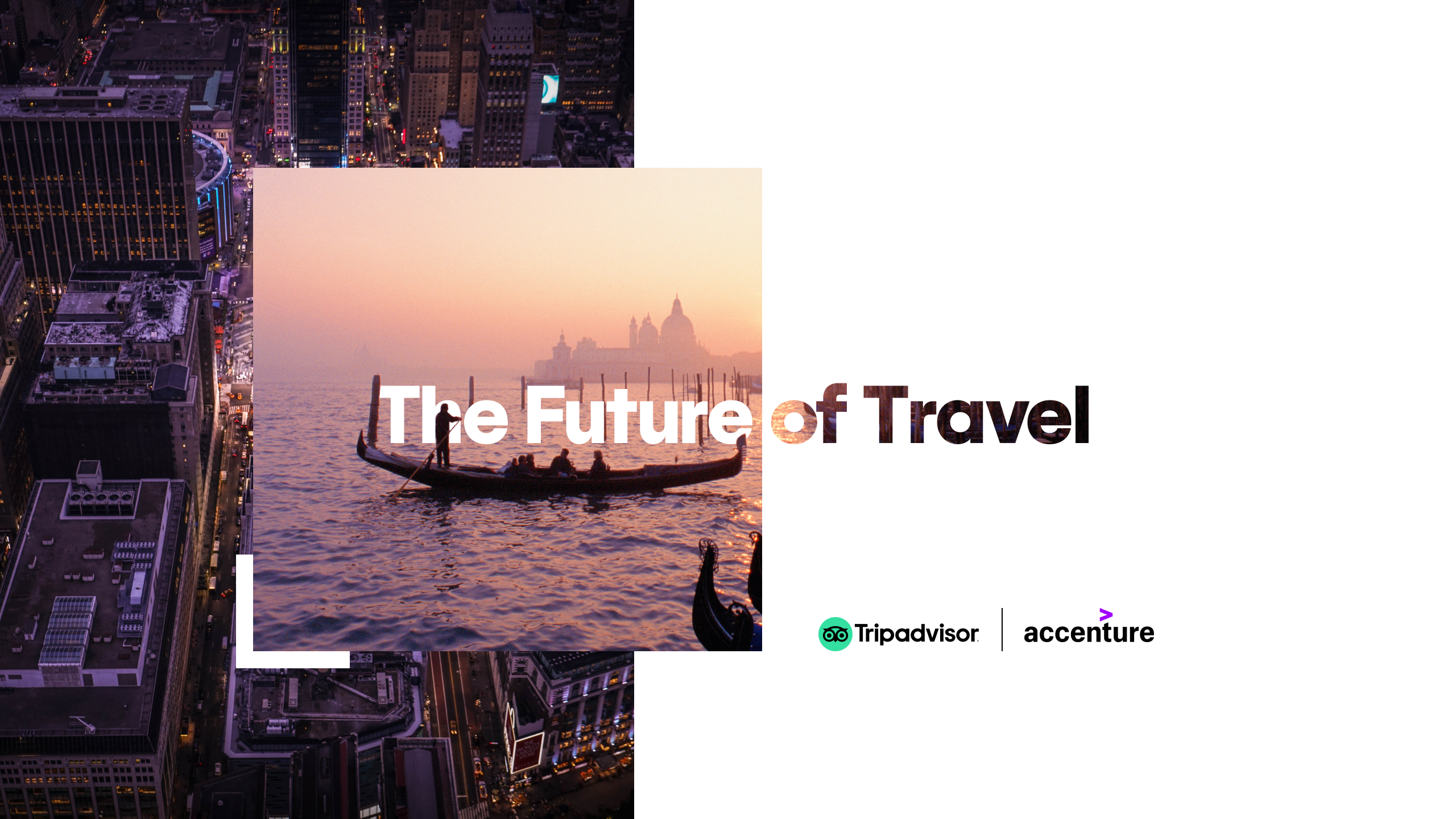
2021 brings a return to confidence
In early March, Accenture and Tripadvisor surveyed 1,000 respondents from across the United States to find out how their travel plans were shaping up for 2021. A year after the pandemic hit US shores, we wanted to explore how Americans, across a comprehensive range of demographic groups and income levels, feel about travel, where they might go next, their anticipated spend behavior and the kind of trip that they are looking forward to taking next.
We found that travel confidence is back — and in a big way. Americans are pushing out of their comfort zone and expanding their travel radius to go further, spend more and most importantly, relax. Of respondents who did not take a trip at all in 2020, 61% said they were comfortable doing so in 2021.
Of course, not everyone’s making plans at the same pace, respondents of our survey earning a yearly income of $100,000+ are leading the way with 34% having already booked a trip for 2021, compared to 19% of the remaining population.
There are clear signs that people are keen to get back on the road — and up in the sky. A quarter (25%) of individuals earning a yearly income of over $100,000 are considering international air travel, and double that — just over half (54%) of the respondents earning a yearly income of more than $50,000 — are considering domestic air travel for their next trip.
These positive indicators of US travelers’ intent and confidence to travel are only part of the story. Interesting trends are emerging regarding where travelers plan to go, and the type of vacations they plan to have when they get there.
In this report, we explore three standout trends emerging in consumer sentiment, that are shaping the US travel market in 2021.
- Early Adventurers
From book to trip, travelers are moving quickly as they plan longer adventures farther from home. - Farther Escapes
The destinations and experiences making a comeback as travel confidence returns. - Luxury in Demand
Millennials are leading the charge to spend big on luxury and relaxation.
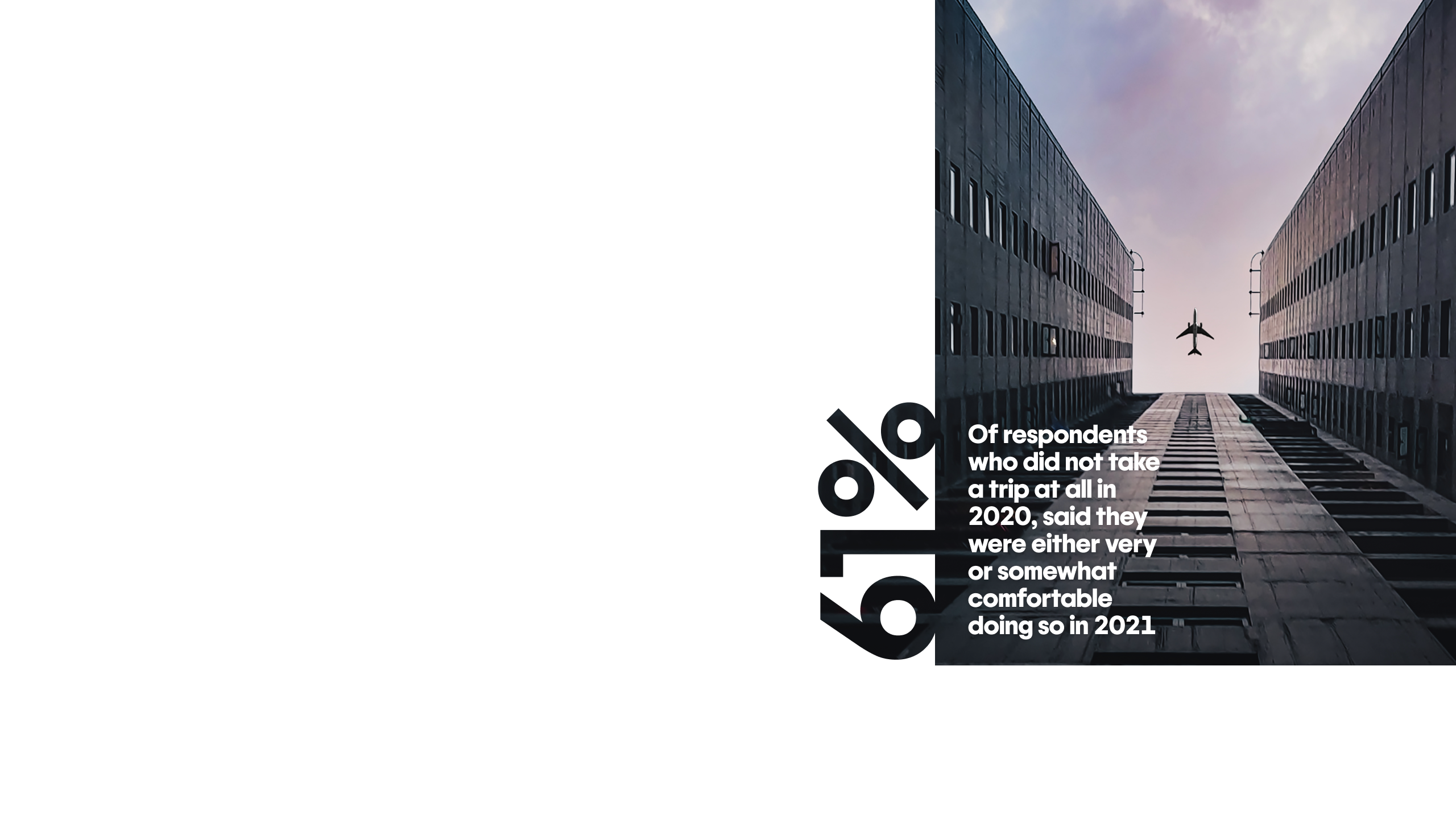
2021 brings a return to confidence
In early March, Accenture and Tripadvisor surveyed 1,000 respondents from across the United States to find out how their travel plans were shaping up for 2021. A year after the pandemic hit US shores, we wanted to explore how Americans, across a comprehensive range of demographic groups and income levels, feel about travel, where they might go next, their anticipated spend behavior and the kind of trip that they are looking forward to taking next.
We found that travel confidence is back — and in a big way. Americans are pushing out of their comfort zone and expanding their travel radius to go further, spend more and most importantly, relax. Of respondents who did not take a trip at all in 2020, 61% said they were comfortable doing so in 2021.
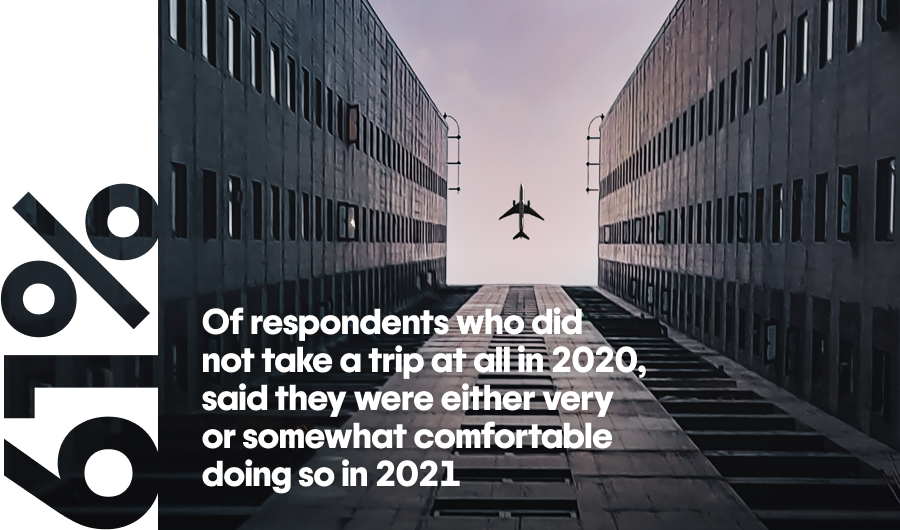
Of course, not everyone’s making plans at the same pace, respondents of our survey earning a yearly income of $100,000+ are leading the way with 34% having already booked a trip for 2021, compared to 19% of the remaining population.
There are clear signs that people are keen to get back on the road — and up in the sky. A quarter (25%) of individuals earning a yearly income of over $100,000 are considering international air travel, and double that — just over half (54%) of the respondents earning a yearly income of more than $50,000 — are considering domestic air travel for their next trip.
These positive indicators of US travelers’ intent and confidence to travel are only part of the story. Interesting trends are emerging regarding where travelers plan to go, and the type of vacations they plan to have when they get there.
In this report, we explore three standout trends emerging in consumer sentiment, that are shaping the US travel market in 2021.
- Early Adventurers
From book to trip, travelers are moving quickly as they plan longer adventures farther from home. - Farther Escapes
The destinations and experiences making a comeback as travel confidence returns. - Luxury in Demand
Millennials are leading the charge to spend big on luxury and relaxation.

The popularity — and necessity — of staying close to home that was a feature of the last 12 months appears to be waning. While in 2020 concerns about health and safety, as well as strict lockdowns, drove the popularity of staycations, in 2021, travelers are eager to get back out. In fact, 22% of US respondents have already booked a trip and are looking to travel longer, farther and within the next three months.
From Book to Trip
Just over half (51%) of respondents who have already booked a trip had a booking lead time (i.e. the time between booking and departure) of less than three months. This may be because early adventurers are more relaxed about COVID-19 factors with 37% comfortable traveling without the vaccine (vs. 21% of unbooked travelers).
People who traveled in 2020 are also more likely to have already booked travel for 2021. Of those who traveled in 2020, 41% have already booked in 2021, compared with 13% of those who did not travel at all in 2020.
Of those who have yet to make a booking, some are waiting for pandemic-related developments to unfold before traveling. Twenty-eight percent (28%) of unbooked travelers say they are waiting on herd immunity before booking a trip, while 22% are waiting to be vaccinated.
With 80% of those travelers who are planning to spend less than $5,000 on travel yet to finalize their 2021 trip plans, there is a tremendous opportunity for travel businesses to capture their attention and secure their bookings.
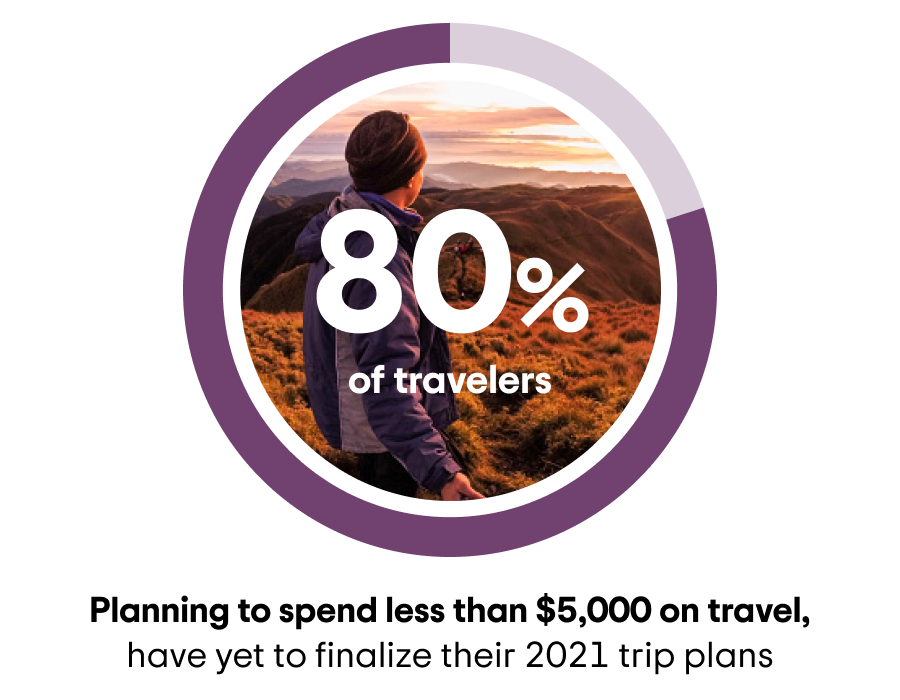
Longer and Farther Trips
Whether they have booked a trip yet or not, our survey found a majority of travelers are planning to enjoy longer vacations in 2021. Eighty-seven percent (87%) of respondents that have booked a trip and 77% of those who have not yet booked a trip note that they are planning a 3+ day getaway.
Early adventurers are planning to venture farther from home. People who have already booked a trip are 5x more likely to be traveling internationally than take a staycation (i.e. a trip less than three hours from home). This compares to unbooked respondents who are only 25% more likely to be planning an international trip over a staycation.

2021 is quickly shaping up to be the year of more extensive trips in the US — gravitating toward more domestic travel and on the brink of the return of international travel. Another notable trend: the comeback and renewed interest in cities and cruises as people return to pre-pandemic choices. This is a potential indicator that consumers are feeling increasingly confident that it is safe to travel to more crowded destinations again, particularly as Covid rates continue to stabilize in the US.
Back in the Air
Our research shows that 70% of all respondents said that their next trip would be domestic (more than three hours’ journey), one in five (19%) are opting for international, and just 12% for a staycation (a trip within a three-hour drive).
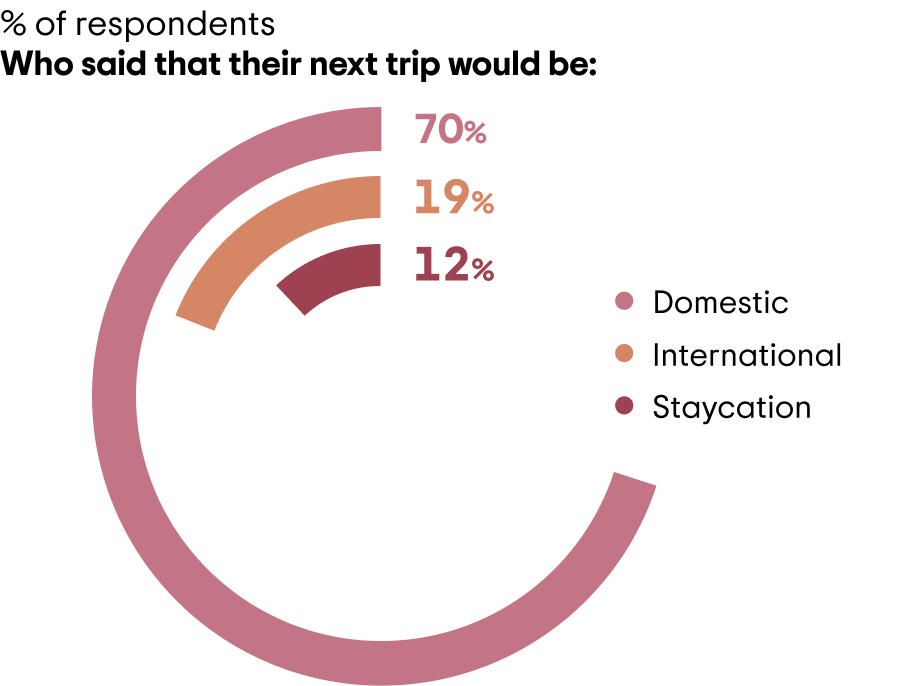
Millennials earning above a yearly income of $50,000 are the most eager to fly. Three out of five (58%) of those surveyed are considering domestic air (compared to 41% among other groups) and one in four (25%) are considering international air travel (that’s 80% higher than the average among respondents in other demographic groups).
Short-range (fewer than four hours) domestic flights are exhibiting high popularity across all generations. Nearly 40% of respondents earning a yearly salary greater than $50,000 are considering these flights for their next trip in 2021, a clear rebound from this time in 2020.
Many US travelers are looking to leave their home areas and packing for more distant domestic regions, flocking particularly to the Southern and Pacific US regions.
Cities make a comeback, but beaches are still No. 1
Although the beach remains the top trip choice for most age and income segments with 30% citing this as their next Spring/Summer destination, our research shows a renewed interest in cities as a destination. One in four (25%) say city destinations are the preferred option for their next trip, a close second to beaches and ahead of other types of nature travel.
The choice of urban instead of nature destinations is particularly pronounced among younger, less affluent travelers. Gen Z respondents earning less than $100,000 annually are twice as likely to visit a city (30%) than a nature destination (beaches excluded). Among the other generations, Gen Xers earning $100,000+ annually are the only ones that show a slight preference of nature.
The adventurous American coasts across all income ranges are interested in cities for their next trip: 34% of Californians and New Yorkers say a city is where they are headed next.
Cruises in consideration
The research also shows cruises as an emerging travel experience for some younger travelers. Of all respondents who identified a cruise as their next leisure trip, over half (58%) were Gen Zers or Millennials. This is consistent with previous research from Accenture1 which found that Gen Zers and Millennials were 35% more likely to feel comfortable taking a cruise in the future than the older generations, globally. While we expect GenX and Boomer interest to recover in the long term, this level of interest from the younger demographics is certainly encouraging for cruise operators’ long-term goals.

After a stressful and complicated year for many, it’s no surprise that travelers whose main goal is relaxation are willing to splurge a little for their next trip. For more affluent travelers, this ultimate desire for a relaxing vacation translates into an intent to spend more on indulgent and luxurious experiences.
Saving to Spend
While the pandemic has been tough for many, some groups — with much of their normal expenditure decreased – have had the benefit of saving over the last 12 months. Thirty-four (34%) percent of Gen-Z and Millennial respondents saved more over the past year than previous years, compared with 25% of Gen-X and Boomer respondents.
High-income Millennials are most likely to spend what they’ve saved on travel. In fact, 32% of high-income Millennials are planning to increase their travel spending in 2021 - almost double the average respondent. While most segments identified cost as a leading factor when booking their next trip (close to 60% of respondents), only 40% of high-income Millennials listed this as a concern.
Must-Have Luxury
High-income Millennials are traveling in style with 37% either having already booked or planning to book a luxury vacation (more than $5,000) as their next travel experience. We observed the highest rate of luxury bookings and planned bookings among Millennials compared with other high-earning groups. Additionally, 48% of high-income Millennials traveled at least once in 2020 and 32% had already booked a trip in 2021 by the time of the survey in early March (before vaccines were widely available to this group).
On the other hand, 62% of respondents across all demographics planning to spend more than $5,000 on their next trip have not yet made a booking, offering an opportunity for upscale businesses and services to capture the attention and bookings of this high-value traveler segment.
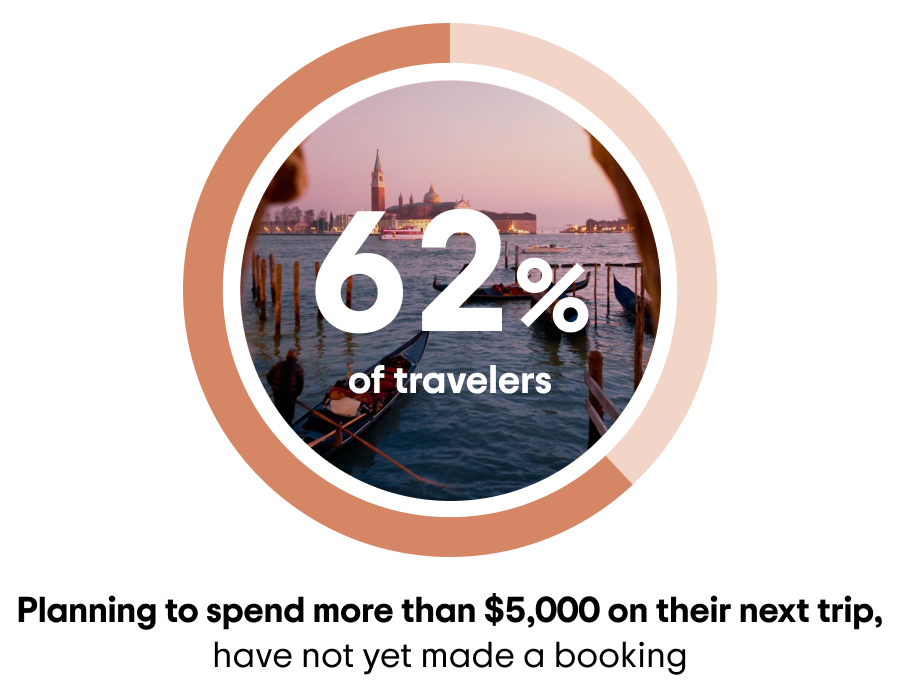
Relaxation
After a year during which not only travel but regular self-care indulgences have been almost completely inaccessible, the emphasis is very much on relaxation for many US leisure travelers in 2021. Across all respondents, the desire to take it easy overrides everything else, with 45% saying relaxation is what they are seeking on their next trip. This is in line with the findings from Accenture’s consumer research that highlights a strong emphasis on self-care and wellbeing, with 67% of consumers saying they’ll spend more time and money on this in 2021. In terms of other motivations, 33% of respondents indicate that cultural tours are the next most popular travel interest.
This time last year, the majority of travel was restricted. A year later, with vaccine distribution in place and infection rates continuing to steady or decline in the US, the majority of US consumers are eager to escape the confines of their four walls and enjoy traveling again.
Coming out of a year fraught with uncertainty, people are taking advantage of the moment, and booking and traveling within 90 days. They are eager to leave their local areas to travel further and stay longer. In this time of growing optimism and adventure, there is no better time for brands and businesses to get on the travel agendas of these eager consumers.
Whether it’s a domestic or international flight, young travelers are going the distance and heading to beaches, cities and even on cruises. We know from experience that where they go, others will follow. With them, they bring hope for those areas that have been hit hard by the pandemic. For local businesses and experiences, it’s important to get ready as soon as possible for recovery to capture the tourist spending that should come with this returned influx. Shifting dollars back into advertising and promotions is critical to remind adventurers that your business has weathered the storm and is ready to welcome them back.
Lastly, and more than anything, all travelers are planning to spend more to achieve what they most crave after a pandemic year: relaxation and indulgence. Brands have a tremendous opportunity to get in front of this high-spending leisure and luxury audience as travelers look to make their first trip back their best and most indulgent yet.
In conclusion, if the experiences of the last twelve months have taught us anything, it’s that things can change very fast. The impetus driving people to travel is greater than ever before and with it, for brands and businesses, comes the opportunity to attract the purchasing power of this high-value and passionate audience. The future of travel starts now.
About the research
The survey used for the insights in this article was sponsored by Accenture & Tripadvisor and executed by Qualtrics. The survey was conducted on March 3, 2021 and interviewed 1,000 respondents from 49 states, evenly distributed across Gen Z, Gen X, Millennial, and Boomer generations. Populations referenced in the article containing less than 30 respondents were attached a 95% confidence interval.
This report is co-authored by Tripadvisor and Accenture:
- Mrinalini Nair, Tripadvisor
- Ryan Gillis, Tripadvisor
- Connor Bradley, Accenture
- Liselotte de Maar, Accenture
- Ross Farquharson, Accenture
- Andrew Maliszewski, Accenture
- Cindy Yu, Accenture


This time last year, the majority of travel was restricted. A year later, with vaccine distribution in place and infection rates continuing to steady or decline in the US, the majority of US consumers are eager to escape the confines of their four walls and enjoy traveling again.
Coming out of a year fraught with uncertainty, people are taking advantage of the moment, and booking and traveling within 90 days. They are eager to leave their local areas to travel further and stay longer. In this time of growing optimism and adventure, there is no better time for brands and businesses to get on the travel agendas of these eager consumers.
Whether it’s a domestic or international flight, young travelers are going the distance and heading to beaches, cities and even on cruises. We know from experience that where they go, others will follow. With them, they bring hope for those areas that have been hit hard by the pandemic. For local businesses and experiences, it’s important to get ready as soon as possible for recovery to capture the tourist spending that should come with this returned influx. Shifting dollars back into advertising and promotions is critical to remind adventurers that your business has weathered the storm and is ready to welcome them back.
Lastly, and more than anything, all travelers are planning to spend more to achieve what they most crave after a pandemic year: relaxation and indulgence. Brands have a tremendous opportunity to get in front of this high-spending leisure and luxury audience as travelers look to make their first trip back their best and most indulgent yet.
In conclusion, if the experiences of the last twelve months have taught us anything, it’s that things can change very fast. The impetus driving people to travel is greater than ever before and with it, for brands and businesses, comes the opportunity to attract the purchasing power of this high-value and passionate audience. The future of travel starts now.
About the research
The survey used for the insights in this article was sponsored by Accenture & Tripadvisor and executed by Qualtrics. The survey was conducted on March 3, 2021 and interviewed 1,000 respondents from 49 states, evenly distributed across Gen Z, Gen X, Millennial, and Boomer generations. Populations referenced in the article containing less than 30 respondents were attached a 95% confidence interval.
This report is co-authored by Tripadvisor and Accenture:
- Mrinalini Nair, Tripadvisor
- Ryan Gillis, Tripadvisor
- Connor Bradley, Accenture
- Liselotte de Maar, Accenture
- Ross Farquharson, Accenture
- Andrew Maliszewski, Accenture
- Cindy Yu, Accenture